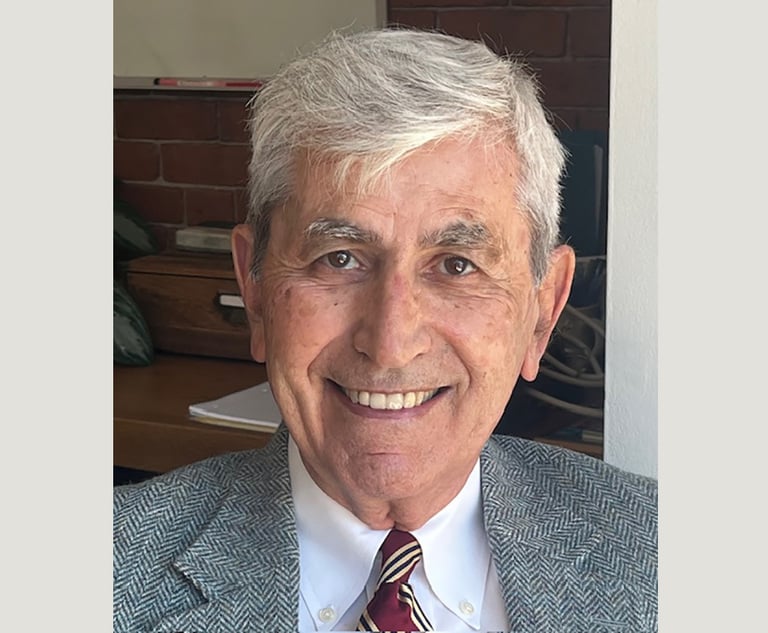Death Penalty Feud Exposes Tension and Private Deliberations at SCOTUS
Justice Clarence Thomas on Monday bluntly declared he was writing “to set the record straight” amid a feud involving Justice Stephen Breyer.
May 13, 2019 at 03:13 PM
7 minute read
The original version of this story was published on National Law Journal
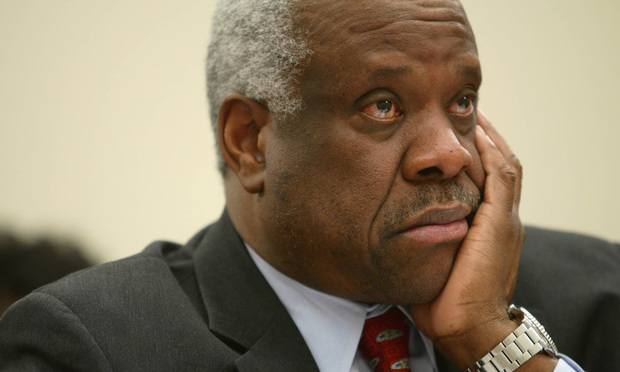 Justice Clarence Thomas, U.S. Supreme Court. (Photo: Diego M. Radzinschi / ALM)
Justice Clarence Thomas, U.S. Supreme Court. (Photo: Diego M. Radzinschi / ALM)
Two extraordinary death row opinions—one belatedly issued six weeks after the U.S. Supreme Court granted the inmate a stay of execution—opened new windows Monday into the private, often tense and conflicting deliberations among the justices.
In Price v. Dunn, an Alabama capital case, Justice Clarence Thomas bluntly declared he was writing “to set the record straight” amid a feud involving Justice Stephen Breyer. And in the other case, involving a Texas inmate, Justice Samuel Alito Jr. wrote on Monday to explain why he thought his colleagues' decision in March to pause the execution was “seriously wrong.”
In the Alabama case, Breyer, writing in dissent in April, said the court should have stayed the execution of prisoner Christopher Price. Breyer had claimed the death sentence was being “carried out in an arbitrary way” and that the court's majority had deviated from “basic principles of fairness” in vacating stays granted by the district court and the U.S. Court of Appeals for the Eleventh Circuit.
Price had argued that an alternative execution method—nitrogen hypoxia—would reduce the risk of pain likely caused by the state's execution drug protocol. The state, in a late-night filing shortly before the scheduled execution, asked the Supreme Court to vacate the stays, which it did. Four justices dissented.
Breyer, joined by justices Ruth Bader Ginsburg, Sonia Sotomayor and Elena Kagan, said the Supreme Court should have discussed the matter first at a conference among the justices. He acknowledged that taking that path would delay the execution by 30 days, but, after outlining the “substantial legal issues” before the court, he said that “in my judgment, that delay was warranted, at least on the facts as we have them now.”
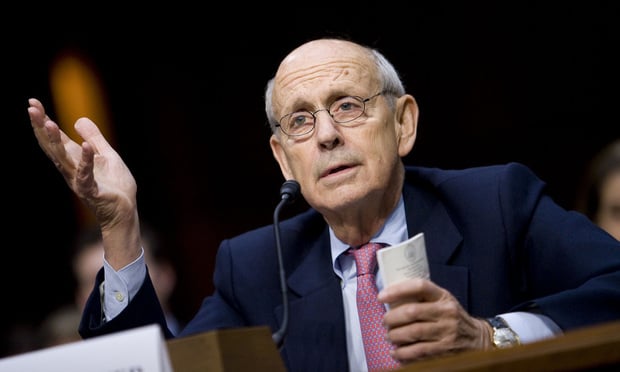 Justice Stephen Breyer on Capitol Hill. (Photo: Diego M. Radzinschi/ ALM)
Justice Stephen Breyer on Capitol Hill. (Photo: Diego M. Radzinschi/ ALM)For the justices to step in and vacate two lower court stays, Breyer wrote, “calls into question the basic principles of fairness that should underlie our criminal justice system. To proceed in this matter in the middle of the night without giving all members of the court the opportunity for discussion tomorrow morning is, I believe, unfortunate.”
Thomas, joined in his Monday concurrence by justices Samuel Alito Jr. and Neil Gorsuch, disputed Breyer's rationale, which he said “does not withstand even minimal legal scrutiny.” Breyer's framing of the issue before the court, Thomas said, was “incorrect” and to suggest that one of the issues before the justices was “difficult” was “disingenuous at best.”
After detailing the gruesome attacks and murder committed by Price, Thomas outlined the legal steps that the inmate's lawyers—from “a well-heeled Boston law firm”—took on his behalf. Thomas said those steps were designed to delay the execution. “Yet four members of the court would have countenanced his tactics without a shred of legal support,” Thomas said. “Indeed, Justice Breyer's six-page dissent musters only one, nonprecedential case citation for a proposition of law.”
And as for Breyer's request to have the case discussed at the justices' private conference, Thomas asserted, “it should be obvious that emergency applications ordinarily cannot be scheduled for discussion at weekly (or sometimes more infrequent) conferences. This approach would only further incentivize prisoners to file dilatory challenges to their executions by rewarding them with defacto stays of execution while requiring timely petitioners to meet the ordinary legal standards for a stay.”
Aaron Katz, a litigation partner at Ropes & Gray in Boston who represents Price, said he thought it was notable Chief Justice John Roberts Jr. and Justice Brett Kavanaugh did not join Thomas' opinion on Monday.
“There's obviously a significant disagreement in the court right now,” Katz said. “We'll have to wait to see whether it deepens or they can bridge the divide. I also think there is a fundamental misunderstanding that lawyers like me are just playing litigation delay. You are in a position where you have to sit down with a death row inmate and answer his questions. I hope positions I have taken on behalf of my client will ultimately win out.”
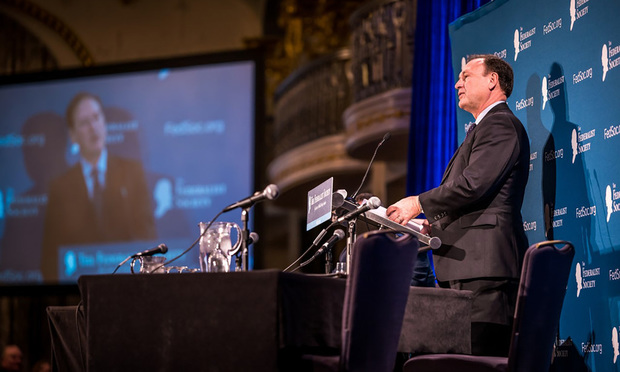 Justice Samuel Alito (Courtesy photo: Federalist Society)
Justice Samuel Alito (Courtesy photo: Federalist Society)In the Texas death case, Murphy v. Collier, the positions of Thomas, Alito and Gorsuch were reversed.
On March 28, the three justices had dissented from the majority's grant of a stay of execution to Patrick Murphy just hours before his scheduled execution. The inmate claimed the state discriminated against him when it refused to allow his Buddhist minister in the execution room but allowed inmates who were Christian and Muslim to have ministers of their faiths in that room.
At the time, only Justice Brett Kavanaugh, who concurred in the stay, wrote to explain his view that the Texas policy amounted to denominational discrimination. He also said in a footnote that, based on the circumstances in the case, he believed Murphy had made his request for a Buddhist minister in a timely manner a month before the scheduled execution.
The high court's action drew substantial commentary and criticism because it appeared to conflict with the justices' earlier refusal to grant an execution stay in another case just weeks earlier. In that case, Domineque Ray, a Muslim, objected to Alabama's refusal to allow an imam to be present in the execution room. The Eleventh Circuit granted a stay because it considered the state policy likely violated the establishment clause.
In vacating that stay, the majority only said Ray essentially waited too late to raise the First Amendment issue. Kagan, joined by justices Ginsburg, Breyer and Sotomayor, disagreed with that rationale in a dissent that outlined the timing of Ray's legal steps. Kagan called the court's decision “profoundly wrong.”
The denial in Ray's case and the grant in Murphy's case showed that the conservative justices are taking an increasingly hard line on last-minute death appeals and view them as mainly tactics to delay executions.
It's not obvious why it took six weeks after the decision in Murphy's case for, Alito, joined by Thomas and Gorsuch, to issue his 14-page dissenting opinion.
In that opinion, Alito accused the inmate of “inexcusable delay” in raising his claims. He noted that Murphy brought his religious liberty claims to the justices six hours before his scheduled execution. And, Alito said, Murphy's tactics “are just as unjustified as those that led the court to vacate a stay of execution” in the Ray case.
“By granting a stay in this case, the court disregards the 'strong equitable presumption' against the grant of such relief when the applicant unreasonably delayed in raising the underlying claims,” Alito wrote. “This presumption deserves greater respect because it serves many important interests.”
Alito showed none of Thomas' disdain for the majority's arguments. He placed blame on Murphy and his lawyers for allegedly dilatory tactics.
Alito also examined Murphy's religion-based claims, concluding that those by Murphy and Ray are important “and may ultimately be held to have merit.” But, he added, “Prisoners should bring such claims well before their scheduled executions so that the courts can adjudicate them in the way that the claims require and deserve and so that states are afforded sufficient time to make any necessary modifications to their execution protocols.”
Read more:
Gorsuch's 'Troubling Dicta' in Death Case Draws Sotomayor Rebuke
Kavanaugh Takes Lead Role Favoring Mississippi Death Row Inmate
SCOTUS Issues Eleventh-Hour Stay in Execution of Texas Buddhist Inmate
Sotomayor Is 'Profoundly Troubled' by Georgia Death Penalty Case
Chief Justice Roberts Joins Liberal Wing to Snub Alabama Court in Death Case
This content has been archived. It is available through our partners, LexisNexis® and Bloomberg Law.
To view this content, please continue to their sites.
Not a Lexis Subscriber?
Subscribe Now
Not a Bloomberg Law Subscriber?
Subscribe Now
NOT FOR REPRINT
© 2025 ALM Global, LLC, All Rights Reserved. Request academic re-use from www.copyright.com. All other uses, submit a request to [email protected]. For more information visit Asset & Logo Licensing.
You Might Like
View All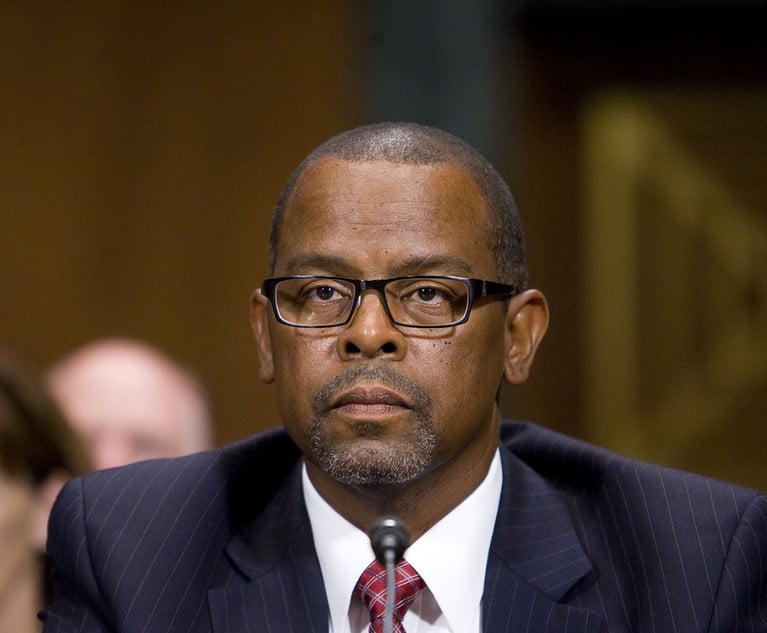
‘Really Deflating’: Judges React to Biden Threat to Veto New Judgeships Bill


Mass. Judge Declares Mistrial in Talc Trial: 'Court Can't Accommodate This Case'
3 minute readTrending Stories
Who Got The Work
J. Brugh Lower of Gibbons has entered an appearance for industrial equipment supplier Devco Corporation in a pending trademark infringement lawsuit. The suit, accusing the defendant of selling knock-off Graco products, was filed Dec. 18 in New Jersey District Court by Rivkin Radler on behalf of Graco Inc. and Graco Minnesota. The case, assigned to U.S. District Judge Zahid N. Quraishi, is 3:24-cv-11294, Graco Inc. et al v. Devco Corporation.
Who Got The Work
Rebecca Maller-Stein and Kent A. Yalowitz of Arnold & Porter Kaye Scholer have entered their appearances for Hanaco Venture Capital and its executives, Lior Prosor and David Frankel, in a pending securities lawsuit. The action, filed on Dec. 24 in New York Southern District Court by Zell, Aron & Co. on behalf of Goldeneye Advisors, accuses the defendants of negligently and fraudulently managing the plaintiff's $1 million investment. The case, assigned to U.S. District Judge Vernon S. Broderick, is 1:24-cv-09918, Goldeneye Advisors, LLC v. Hanaco Venture Capital, Ltd. et al.
Who Got The Work
Attorneys from A&O Shearman has stepped in as defense counsel for Toronto-Dominion Bank and other defendants in a pending securities class action. The suit, filed Dec. 11 in New York Southern District Court by Bleichmar Fonti & Auld, accuses the defendants of concealing the bank's 'pervasive' deficiencies in regards to its compliance with the Bank Secrecy Act and the quality of its anti-money laundering controls. The case, assigned to U.S. District Judge Arun Subramanian, is 1:24-cv-09445, Gonzalez v. The Toronto-Dominion Bank et al.
Who Got The Work
Crown Castle International, a Pennsylvania company providing shared communications infrastructure, has turned to Luke D. Wolf of Gordon Rees Scully Mansukhani to fend off a pending breach-of-contract lawsuit. The court action, filed Nov. 25 in Michigan Eastern District Court by Hooper Hathaway PC on behalf of The Town Residences LLC, accuses Crown Castle of failing to transfer approximately $30,000 in utility payments from T-Mobile in breach of a roof-top lease and assignment agreement. The case, assigned to U.S. District Judge Susan K. Declercq, is 2:24-cv-13131, The Town Residences LLC v. T-Mobile US, Inc. et al.
Who Got The Work
Wilfred P. Coronato and Daniel M. Schwartz of McCarter & English have stepped in as defense counsel to Electrolux Home Products Inc. in a pending product liability lawsuit. The court action, filed Nov. 26 in New York Eastern District Court by Poulos Lopiccolo PC and Nagel Rice LLP on behalf of David Stern, alleges that the defendant's refrigerators’ drawers and shelving repeatedly break and fall apart within months after purchase. The case, assigned to U.S. District Judge Joan M. Azrack, is 2:24-cv-08204, Stern v. Electrolux Home Products, Inc.
Featured Firms
Law Offices of Gary Martin Hays & Associates, P.C.
(470) 294-1674
Law Offices of Mark E. Salomone
(857) 444-6468
Smith & Hassler
(713) 739-1250





